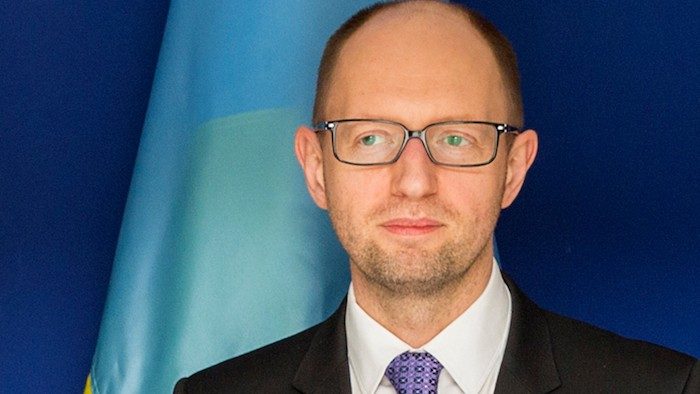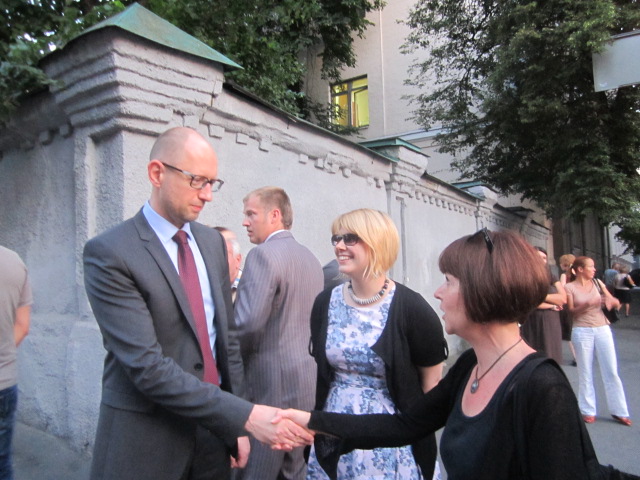
This is an excerpt from Ukraine’s Euromaidan: Broadcasting through Information Wars with Hromadske Radio by Marta Dyczok
Available now on Amazon (UK, USA, Ca, Ger, Fra), in all good book stores, and via a free PDF download. Find out more about E-IR’s range of open access books here
The military hospital was founded in Kyiv in 1755. Today it houses soldiers wounded in what’s called the Anti-Terrorist Operation in eastern Ukraine’s Donbas region.
I’d walked past its tree lined walls on my way home from the archives in previous summers, not really paying much attention to it.
Now soldiers with machine guns guard the entrance. But they looked pretty relaxed on the sunny afternoon when I arrived with friend and a basket of fruit. We asked how to get to the wounded, and offered them some. “Thank you, but we’re not allowed,” they said, eyeing the basket. They directed us to the volunteer headquarters, and we walked in.
Seeing a map, I took out my camera and photographed it. One of the guards rushed up and said, “No photographs, please, this is a military installation, it’s not allowed.” I apologized. “You’ll have to erase the photo you took,” he said apologetically. “You understand, if it was my superior, he’d confiscate your camera.”
Inside the walls I saw an elegant, park like environment, with neatly tended gardens and old buildings in a courtyard formation. People strolling around casually. We couldn’t remember which archway to look for so stopped a passing car and asked, offering the uniformed soldier fruit. He took a plumb, and a pear, and when he was reaching for more I stopped him and said, “they’re for the wounded.” My friend interrupted me and encouraged him to take as much as he wanted. “He’s been to the war zone and has been beaten,” she explained to me as we walked on. She’d seen it in his eyes.
The volunteer station was full of people. Hallways lined with bags of fruit, dried goods, medicine, clothes, all neatly organized. The volunteers liked our basket so instead of asking us to just leave it in the hall, they agreed to escort us while we distributed the fruit.
Walking through the grounds we saw all sorts of wounded. Our escort described them to us. “That young man is 30,” she said. A few people were helping him walk “He used to be a kick boxer,” our guide continued: “When the fighting started he volunteered for one of the battalions, raised money for his own equipment and went to the war zone. He didn’t have enough for a helmet, but went anyway. He sustained a head injury and is now missing part of his brain plate.”
As we offered him our basket, his kind eyes just looked straight ahead. “He can’t see, or hear,” said the woman holding his elbow. It was his mother. “Why don’t you select what he likes?” my friend suggested. The mother took a few grapes, some pears. “How about an apple?” I suggested. “No, he doesn’t like apples,” the mother answered. So I took some more grapes and placed them in the palm of his hand, watching as his fingers curled around the sun warmed fruit. His eyes were open but had a look of not understanding what was happening. Something many Ukrainians must be feeling.
There were two men sitting in a gazebo. One asked if he could take some fruit for his girlfriend. The other would only take one plum. I encouraged him to take more, but he politely refused and said, “there are many others here.”
We were then taken into one of the buildings, a recovery ward. The high ceilinged hallway was silent, except for the sounds of our footsteps.
In room 11 we met two parachutists. Each was missing an arm. One was able to sit up and select his fruit. The other couldn’t move, so his mother took some for him, as he smiled and profusely thanked us.
I didn’t want to intrude on any more pain, but wasn’t ready to leave. Seeing a group of men chatting on a bench, I suggested that we sit on the one next to them.
A woman with long, flowing, dark hair was pushing a young man in a wheelchair on the path next to us. My friend recognized her and said, “That woman is very wealthy. She comes here every day and talks to the wounded men. The one in the wheelchair is 19 years old, the same age as her son, and has lost a leg. She’s paying for an artificial one.”
 The previous day I saw Ukraine’s (then) Prime Minister on my way home. Arseniy Yatseniuk was walking down Hrushevs’ka Street, from Parliament, towards the Cabinet of Ministers building.
The previous day I saw Ukraine’s (then) Prime Minister on my way home. Arseniy Yatseniuk was walking down Hrushevs’ka Street, from Parliament, towards the Cabinet of Ministers building.
I spotted him because he’s a little taller than the men he was walking with. “Look, it’s Yatseniuk,” I said to my friends, pulled out my camera, and started snapping away. He noticed, so I walked up, held out my hand, and introduced myself.
“Where are you from?” he asked. “Canada,” I answered.
Given the week he’d had, I was amazed how calm he looked, and how he was so casually friendly. Just the other day, the usually restrained lawyer-economist turned politician gave an emotional speech to Parliament. He submitted his resignation, saying that he could not continue, when elected MPs refused to adopt laws that would release additional funds for the war effort, and the ruling coalition dissolved.
In my opinion, he’s been doing a tremendous job since taking over the government after corrupt president Yanukovych fled five months ago. So, I told him so and added that I’d said the same on Canadian national television when news of his resignation broke. He smiled, modestly, and said “thanks.”
My friends wanted to get a picture with the PM, and he seemed chuffed. As we were gathering around for the shot, he graciously said, “May I introduce you to my colleague, Oleksander Turchynov, the Parliamentary Speaker. Perhaps you’d like him to be in the photo as well?” Of course we agreed.
Other passers-by also stopped to shake Yatseniuk’s hand and thank him for the work he was doing. He took the time to speak to each of them before getting into the car that was waiting for him. Later I learned that he was on his way to appear on a live political talk show where he appealed for national unity.
Further Reading on E-International Relations
- Ukraine and the Russian Challenge to the European Order
- Opinion – Russian Motives in Ukraine and Western Response Options
- Russia-West-Ukraine: Triangle of Competition 1991–2013
- The Maidan Revolution in Ukraine
- Opinion – The West’s Mental Lockdown over Putin’s Invasion of Ukraine
- Russia’s War in Ukraine Points to Another Historical Blunder